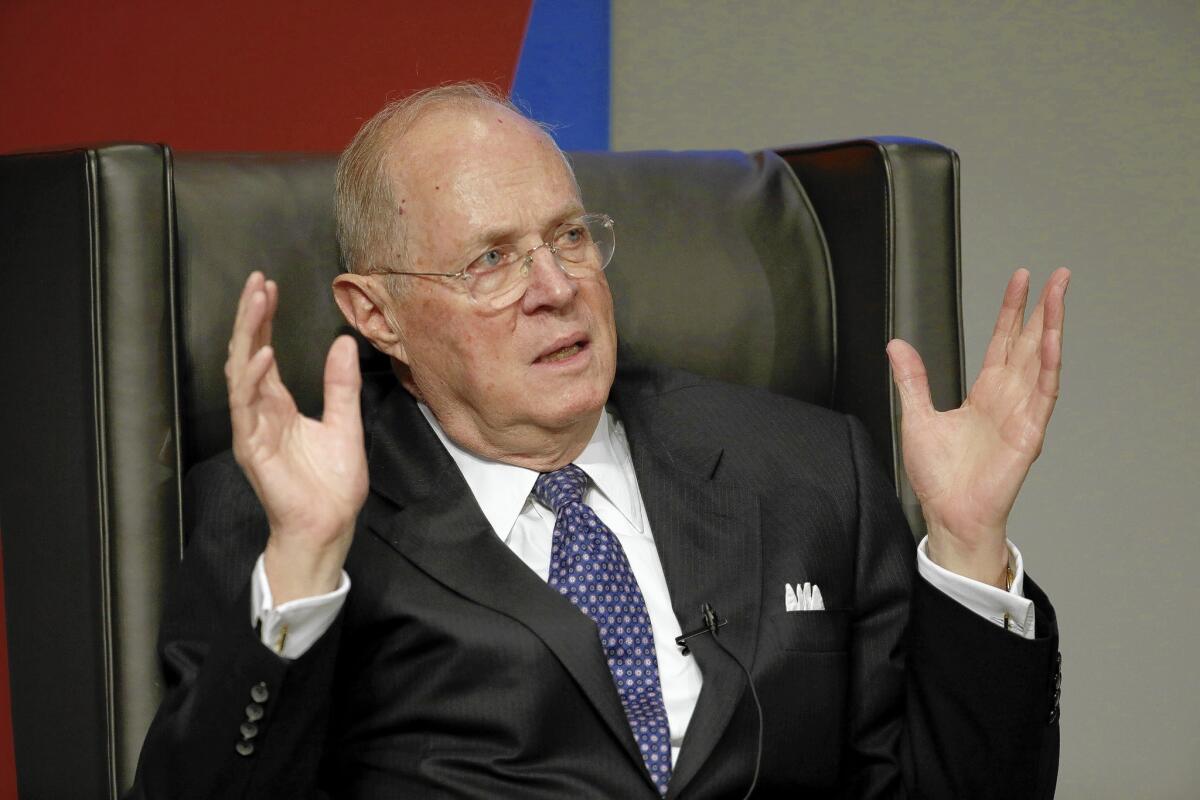Opinion: The Supreme Court starts its new term on Monday. Expect divisiveness

During the last Supreme Court term, which followed the bruising confirmation fight over Brett Kavanaugh, the justices seemed to intentionally shy away from taking up the most controversial legal questions. That certainly isn’t the case for the court’s coming term, which begins Monday. Over the next several months, the justices will decide divisive cases involving gay and lesbian rights, immigration and gun control.
I suspect we will deeply feel the absence of Justice Anthony M. Kennedy.
For the record:
11:37 a.m. Oct. 6, 2019The headline on an earlier version of this story said the new Supreme Court term started on Tuesday. It starts on Monday.
The court’s plunge into controversy will begin immediately. On Tuesday, justices will hear two important matters concerning federal employment discrimination law. The first hour of oral argument will concern a pair of cases brought by men alleging they were fired for being gay. The cases revolve around whether employment discrimination based on sexual orientation violates Title VII of the 1964 Civil Rights Act, which forbids discrimination because of sex.
The plaintiffs argue that firing a person on account of being gay or lesbian is an adverse employment action based on sex. A simple example helps illuminate that argument. Imagine an employee named Chris. Chris and the employer have never met in person but have had frequent email communications. Chris often has referred to a husband in their correspondence, discussing weekend plans or other personal matters. When the employer and Chris finally meet in person, the employer is surprised to discover that Chris is male. The employer says that his religious beliefs disapprove homosexuality and fires Chris. Chris was fired solely “because of” sex, the plaintiffs maintain. If he were female, he would still have the job.
The employers and the administration of President Trump argue that Congress never intended the 1964 statute to deal with sexual orientation in employment. They argue that since the employer would have fired either a gay man or a lesbian on discovering he or she was gay, there is no discrimination based on sex.
The other case to be argued on Tuesday involves whether discrimination against transgender individuals violates Title VII. Aimee Stephens was fired by Harris Funeral Homes when she announced that she was transitioning to become a woman. Stevens argues that her firing was because of her sex and also for not adhering to gender stereotypes, something the court already has found to violate Title VII. The Trump administration, reversing a position taken by the Obama administration and by the Equal Employment Opportunity Commission, says there was no sex discrimination because the employer would have fired any transgender person, male or female.
In every Supreme Court case up to now that affirmed the rights of gays and lesbians, Anthony Kennedy wrote the majority opinion for a deeply divided court. Both sides in the current cases know that the crucial question is whether any of the other conservative justices will join with the liberals to create a majority in favor of the plaintiffs.
Immigration is another issue likely to divide the court this year. On Nov. 12, the justices will hear oral arguments in three cases about whether Trump acted improperly in rescinding Deferred Action for Childhood Arrivals, or DACA, a program protecting from deportation about 800,000 individuals brought to the United States as children.
The stakes in this case are enormous for the so-called Dreamers, including many who are students at my law school or in my university. If he were still on the court, all eyes would focus on Anthony Kennedy as the likely swing vote. But without him on the bench, is there a possible fifth vote against the president’s action?
For now, DACA is the primary immigration matter on the Supreme Court’s docket, but there could well be others by the end of the term, including cases examining whether Trump acted illegally in diverting military funds to pay for border wall construction or in unilaterally changing asylum policy.
A third highly partisan issue before the court this term involves the 2nd Amendment. On Dec. 2, the justices are scheduled to hear oral arguments on the constitutionality of New York City’s ban on transporting licensed handguns to a home or shooting range outside city limits. New York has adjusted its law, so it is possible that the court will decide to dismiss the case. If not, it will be the first major ruling on the scope of the 2nd Amendment in over a decade.
Other important cases on the docket for this term involve separation of church and state, the scope of a federal civil rights law prohibiting race discrimination in contracting, and the availability of the insanity defense in criminal cases. Before the end of the term, the court could also take cases concerning abortion rights and the constitutionality of the Affordable Care Act.
As the cases are decided in the spring of 2020, in the midst of a presidential election year, it will be a powerful reminder of the importance of elections in determining the composition of the court.
Erwin Chemerinsky is dean of the UC Berkeley School of Law and a contributing writer to Opinion.
More to Read
A cure for the common opinion
Get thought-provoking perspectives with our weekly newsletter.
You may occasionally receive promotional content from the Los Angeles Times.






